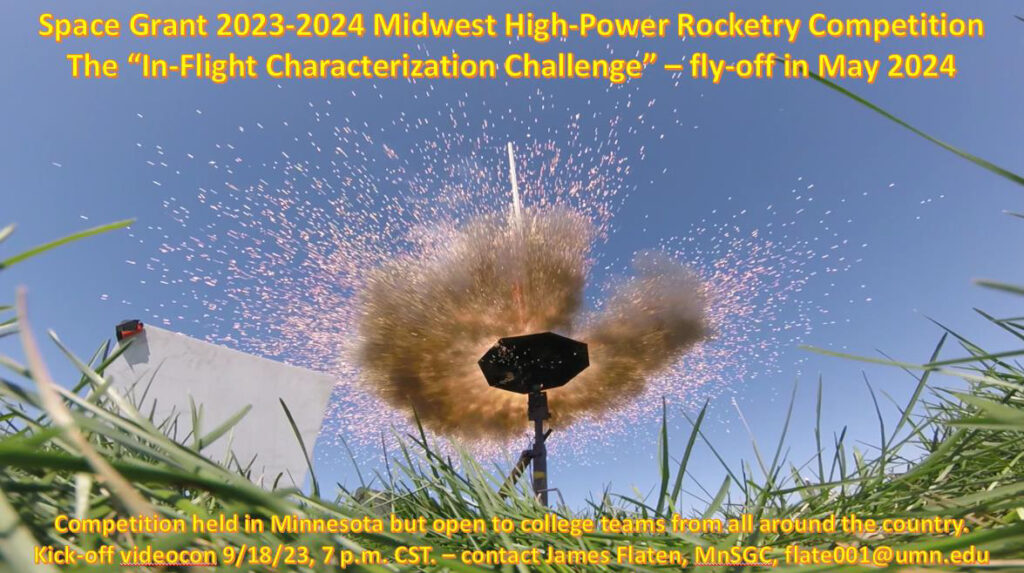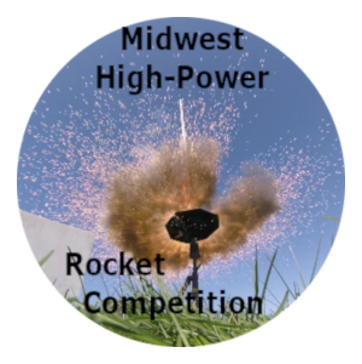The Minnesota Space Grant Consortium (MnSGC), working with the Tripoli Minnesota High-Power Rocketry Club, hereby announces the 2023-2024 Space Grant Midwest High-Power Rocketry Competition.
The fly-off will be held in Minnesota, but this competition is open to college and university student teams from across the nation during the 2023-2024 academic year. This competition is an opportunity for students to design and construct high-power rockets, to be launched in May 2024 from a Tripoli high-power rocket club launch site just north of Minneapolis.
No previous experience
in high-power rocketry is necessary to compete!
Up to 30 college and university teams, sponsored by their states’ Space Grant consortia, will be accepted into this competition.
Interested teams from any state, not just those in the Space Grant Great Lakes Midwest Region, are required to garner local Space Grant “sponsorship” (this might or might not involve financial support, depending on the state) then submit a non-binding “Notice of Intent to Compete” to the MnSGC by October 1, 2023, in which they list the team’s student members and student certification levels (if any), team name, and a committed faculty adviser.
Note – institutions not planning to form a team until Spring 2024 still should also submit a Notice of Intent to Compete by October 1, 2023, naming a faculty adviser (so that we know who to send updates to.)
Teams are also required to consult with a non-student mentor who has high-power rocketry experience and is certified Level 2 or higher. Competition organizers can help teams find a certified high-power rocketry mentor, if need be.
A kick-off informational videocon will be held from 7–8 p.m. Central Time on Monday, September 18, 2023, for teams planning to spend the full academic year on this project. This kick-off informational videocon will be repeated on Thursday, January 11, 2024, for teams working just during the winter or spring terms.
A registration fee of $400 per team, due by January 31, 2024, will be charged to cover competition costs, of which up to $100 may be applied toward the purchase of motors for use at the in-person competition fly-off. States sponsoring two or three teams will be expected to provide one judge for written and oral reports and the in-person competition fly-off. States fielding four or more teams may be asked to provide two judges.

The 2023-2024
“In-Flight Characterization Challenge”
Students teams will design and construct a single motor, single stage, high-power rocket that will fly twice during the competition.
This year the challenges are:
(A) Minimize roll during the middle 50% of the coast with no moving parts (roll will be documented using a look-down camera, backed up with gyro sensors), and
(B) Carry a “non-commercial” (i.e., not sold for rocketry) data-logging sensor suite to monitor vehicle performance so as to make an in-flight estimate of peak altitude (a.k.a. apogee) within 3 seconds of motor burnout (i.e., before the rocket reaches apogee). Sensors should be selected to deduce the actual air friction on the vehicle (to replace the estimated air friction value used by simulation software) and the actual total impulse of the motor (which might vary from the total impulse reported by the motor manufacturer by up to 10%).
All rockets will fly first on a Cesaroni 273-H-225-14A “White Thunder” motor, followed by a second flight which can be on any Cesaroni or AeroTech I-class motor. Both flights must reach at least 1000 ft AGL (above ground level), but not exceed 3,000 feet above ground level. Internal modifications (parachute, ballast, etc.) are allowed between flights, but not external modifications.
Bonus points will be given to:
(1) Teams whose members increase their certification level using individually-built rockets in parallel with the team-built competition rocket;
(2) Teams that can make a 3-D prediction of apogee, including relative lateral position with respect to the launch site and absolute position (GPS). This will require additional sensors, not just a 1-D apogee estimate, within 3 seconds of motor burnout; and
(3) Teams that can transmit their estimates, and other performance data, to a ground station using a “noncommercial” radio telemetry system before the rocket reaches apogee. Additional details about the competition are included in a handbook. Note: All fabrication work on the rockets, except for possibly machining of fiberglass, carbon fiber, or metal parts, must be performed by students.
The competition will include two written reports about the design, analysis, simulation, build, and test flight results of the competition rocket, an oral presentation, plus a written assessment of competition flight data/results. These will be scored by a panel of professional engineers from both academia and industry.
Scoring of the pre-fly-off reports and the post-flight reports will focus on rocket design and performance. More details about the competition motors, reports, deadlines, etc. will be described in a competition handbook and discussed during the informational videocons. A competition handbook, including a more-extensive description of the challenge rules, will be posted by September 18, 2023, at this link.
Logistical questions may be directed to James Flaten, Minnesota Space Grant and University of Minnesota Twin Cities: flate001@umn.edu
Technical questions may be directed to Gary Stroick, Tripoli Minnesota High-Power Rocketry Club: president@offwegorocketry.com
Important Dates
• Kick-off & informational videocon: Monday, September 18, 2023, (repeated Thursday, January 11, 2024) from 7–8 p.m. Central Time (contact James Flaten, flate001@umn.edu, for call-in information).
• Garner your state’s Space Grant sponsorship and submit a non-binding “Notice of Intent to Compete” by October 1, 2023. This applies to all institutions, including schools that plan to form their team later than October 1, 2023.
• A non-refundable $400 Team Registration Fee is due by January 31, 2024, of which up to $100 may be applied toward the purchase of competition motors.
• In-person Competition Dates: Presentations & Safety Checks on Saturday, May 18, 2024* (mid-afternoon & evening); flights on Sunday, May 19, 2024* (all day, plus an evening banquet (even if we have not flown).
• Alternate (weather-delay) Flight Date: Monday, May 20, 2024* (as long as needed).
* If Minnesota has a particularly wet spring and the launch site clearly will not be useable by mid-May, the competition dates might need to shift. This will be announced as far in advance as is practical. See details in the handbook.
Tripoli Minnesota High-Power Rocketry Club
